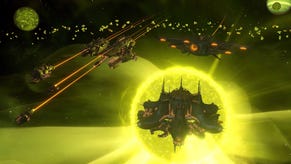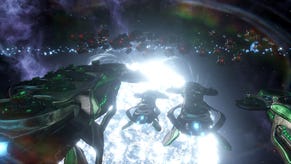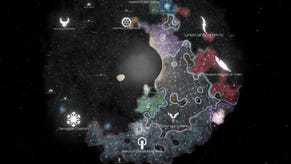Stellaris Review
So much space for activities!
Space is quiet, for a little while. Unlike Paradox's other grand strategy games, Stellaris doesn't tell you everything from the start. You're not ready for that yet. If you're a bit of a space romantic, you might look out at the great expanse and get a sense that something's happening out there in the darkness. It has to be, surely? But right now, your concerns are much smaller than that. Before you can think about colonising distant worlds or subjugating alien races, you first need to understand your own solar system. This takes time, as you send a scientist, aboard their own ship, to scan each of the planets and determine whether there's anything useful to research, or mine. Whilst you're doing that, you might want to think about improving the infrastructure on your home planet, or spending some influence to increase the amount of food being produced. This is how the very early game plays out. You're not a galactic powerhouse, not for the time being. You're a single planet that's just getting to grips with spaceflight.
And yet, each time you unpause the game and watch your tiny civilisation slowly reaching outwards, it's humbling to think about the other empires - big and small - that are doing just the same. You won't know where they are, what they look like, or what they believe in, but they exist and eventually you're going to meet them. I love the sense of inevitability. This added emphasis on exploration also does a couple of really useful things for Stellaris, compared to other games from this studio. Starting small gives it a chance to drip feed information to the player as they go, avoiding that overwhelming moment that comes with starting a game of Crusader Kings 2, or Europa Universalis 4. You don't need to spend 30 minutes assessing the military strength of your neighbours, because you haven't even met them yet. That makes for a much, much easier introduction.
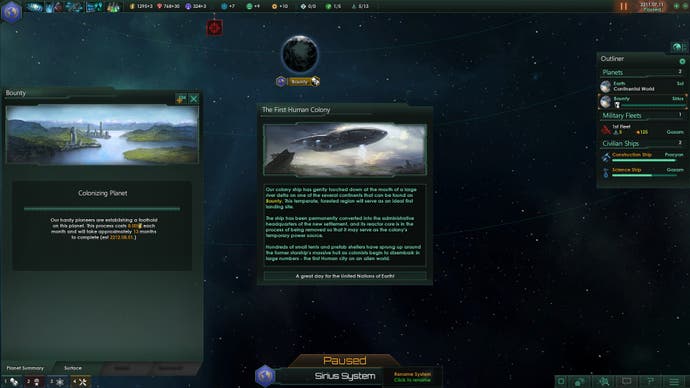
This idea of venturing into the unknown also ensures that first contact feels incredibly important. And shouldn't it?! In Stellaris, that single moment changes everything. Up until this point you'll have been blundering between a handful of solar systems, researching tech that sounds flashy and maybe expanding your military a bit, because that feels like the right thing to do. Now, finally, you have someone to compare yourself to. This is huge! How have they already colonised three planets, you might ask. Should you have been doing that? Are you already behind the galactic curve? The rest of your game will involve comparing yourself, sometimes enviously, to other empires. Your brief window of naivety is over.
My first contact was with an alien race of molluscs called the Djomars. They had quite a few more eyes than my own human population, which was concerning, but worse than that, they didn't really like us very much. In fact, they didn't particularly like any race that wasn't the Djomars, and they weren't crazy about our views on individual freedom either. Not a great start, to be honest. Every empire in Stellaris - aside from your own, which can be selected from a list of premades, or entirely customised - is procedurally generated. Unfortunately, in this case, the Djomars had been procedurally generated to hate me.
There are some rules in place, to ensure that the empires you encounter make some degree of sense. Certain traits are associated with certain government types, to avoid any weird juxtapositions. As a result, these alien races you encounter feel hand-crafted, despite coming from a gigantic pool of species/government/belief combinations. I'm also a big fan of the two-word descriptions Stellaris uses to convey the many different government types to the player - ranging from boring things like 'Military Dictatorship', to much more exciting words like 'Enlightened Monarchy' or 'Plutocratic Oligarchy'.
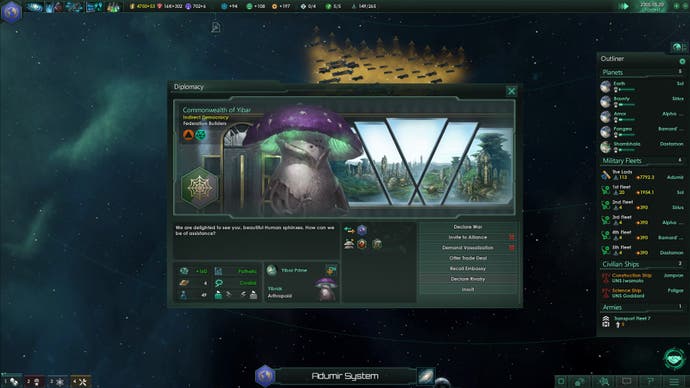
The one useful thing about finding yourself neighboured with an empire of space racists, is that chances are, nobody else will like them much either. After a few decades of peaceful expansion, I would draw borders with a number of other empires, one of which happened to share many of the same principles as my own. The Igarian Sovereignty were a Democratic Utopia (good!) and they considered themselves individualists (good!). They also sort of looked like anteaters wearing clothes, which I was really into. An obvious alliance in the making.
When war is declared in Stellaris, it often seems to come down to one, big decisive battle. Depending on the preferred method of FTL technology (warp, hyperspace, or wormhole), you may find that your fleet can outmaneuver the enemy, but to achieve a high enough warscore to, say, vassalise the Djomar Empire, you have to take out their fleet.
As with Paradox's other grand strategy games, the combat mostly comes down to preparation. Each fleet displays a military value, which means you should have an idea of how you'll fare in battle. In my experience, ensuring you have a larger number than your opponent is always the key. Depending on the research path you choose, you'll unlock new ship designs, weapons, shields and other bits and pieces. Then, using a fairly rudimentary ship builder, you put together a design that you want to integrate into your fleet. Most of this can be automated, including any upgrades for your existing ships, which is a relief.
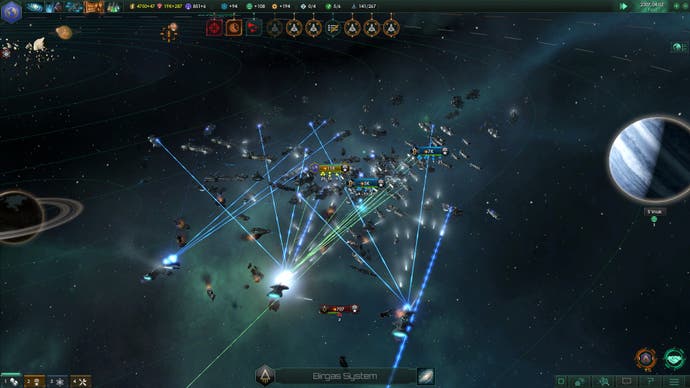
The battles themselves end up quite a passive affair for the player. Other than selecting targets and giving the order to retreat, your influence over what's happening within the engagements themselves is pretty minimal. Thankfully - and this is something of a first for Paradox - they're really fun to watch. Witnessing two large fleets clash becomes a frenzy of laser fire and explosions, with colossal (expensive!) ships being torn apart in real-time. We've never had that before, and it adds a lot. Losing a fleet isn't as simple as watching a number deplete, it's a furious mess of colour and noise. There's even some basic camera controls, allowing you to find your preferred angle with which to watch. Paradox, you're spoiling us!
Perhaps the most impressive thing that Stellaris manages, though, is the way in which it continues to keep the player in check. In most grand strategy or 4X games that I've played, the early game is always the highlight. Once your family/nation/empire grows to a certain size, you become unstoppable. The game is essentially over at this stage, as you steamroll your way towards whatever victory condition you have in mind. Stellaris makes this much more difficult.
We've talked about the early game, in which you explore and interact with other empires individually, but later on this gives way to something bigger. Unless you're pursuing a very aggressive, isolated campaign, you'll find that alliances prove vital. The relationship I formed with the Igarian Sovereignty was the reason I managed to stay competitive on a galactic scale. As you approach the mid-game, you'll find that many of the strongest empires began to team up with like-minded allies, and if you don't follow suit, you simply won't be able to stand against them.

These powerful alliances eventually give way to federations, which allow for multiple empires to operate as a single entity. A president will be regularly elected, and should they come from your empire, you'll be in such an important position - dictating the foreign policy for the entire group and building ships using their very best technology. The mid-game is all about federations.
Even if you manage to control the most powerful federation in the galaxy, Stellaris still isn't ready to let you sit comfortably, introducing the possibility of late-game catastrophes. Usually the result of overambitious research, these events provide one final opportunity for the player to lose everything, even after making it tens of hours into a campaign. My favourite example of this is the AI revolt, which sees synthetics across the galaxy turning on their former rulers. Perhaps you've benefited from a robotic workforce, or perhaps you're not even remotely responsible: it doesn't matter. You're now up against a single, galaxywide faction and everything can fall to pieces. Finally, the late-game matters.
In many ways, the Stellaris I've played is but a starting point for modding support and a DLC plan that'll keep us going for years to come. But what a starting point it is! Leaving behind the shackles of historical accuracy has allowed Paradox to play around with so many new ideas, but somehow, whilst doing so, they've created a grand strategy game that isn't entirely terrifying to start playing in the first place. If you've ever wanted to dip your toe into this incredible genre, but found Paradox's other stuff a bit intimidating, this is the one to play. If you've enjoyed their other stuff, this one's even better.





